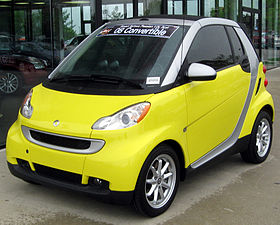Smart ForTwo
| Smart Fortwo | |
|---|---|
 |
|
| Overview | |
| Manufacturer | Daimler AG |
| Also called | SmartCar (1998–2002) Smart City Coupé |
| Production | 1998–2007 (MkI) 2007–2014 (MkII) 2014–present (MkIII) |
| Assembly | Hambach, France |
| Body and chassis | |
| Class |
City car (A) Kei car (Smart K) |
| Body style | 3-door hatchback 2-door convertible |
| Layout | RR layout |
| Related |
Smart Roadster Smart Forfour |
| First generation (W450) | |
|---|---|
 |
|
| Overview | |
| Also called | Smart City Coupé (1998–2002) Smart Fortwo (facelift) |
| Production | 1998–2007 |
| Body and chassis | |
| Body style | 3-door hatchback |
| Powertrain | |
| Engine | 0.6 L petrol (turbo) I3 0.7 L petrol (turbo) I3 0.8 L diesel (turbo) I3 |
| Transmission | 6-speed semi-automatic |
| Dimensions | |
| Wheelbase | 1,810 mm (71.3 in) |
| Length | 2,500 mm (98.4 in) |
| Width | 1,510 mm (59.6 in) |
| Height | 1,500 mm (61 in) |
| Curb weight | 1,610 lb (730 kg) |
| Second generation (W451) | |
|---|---|
 |
|
| Overview | |
| Production | 2007–2014 |
| Body and chassis | |
| Body style | 3-door hatchback |
| Powertrain | |
| Engine | 0.8 L diesel (turbo) I3 1.0 L petrol I3 1.0 L petrol (turbo) I3 |
| Transmission | 5-speed semi-automatic |
| Dimensions | |
| Wheelbase | 1,870 mm (73.5 in) (2008–10) 1,867 mm (73.5 in) (2011–) |
| Length | 2,690 mm (106.1 in) (2008–10) 2,695 mm (106.1 in) (2011–) |
| Width | 1,560 mm (61.4 in) (2008–10) 1,559 mm (61.4 in) (2011–) |
| Height | 1,540 mm (60.7 in) (2008–10) 1,542 mm (60.7 in) (2011–) |
| Kerb weight | 750–795 kg (1,653–1,753 lb) (coupe) 780–820 kg (1,720–1,808 lb) (cabrio) |
| Smart Fortwo (W453) | |
|---|---|
 |
|
| Overview | |
| Production | 2014–present |
| Body and chassis | |
| Body style | 3-door hatchback 2-door cabriolet |
| Related | |
| Powertrain | |
| Engine |
|
| Transmission | 5-speed manual twin clutch automated manual |
| Dimensions | |
| Wheelbase | 1,873 mm (73.7 in) |
| Length | 2,695 mm (106.1 in) |
| Width | 1,663 mm (65.5 in) |
| Height | 1,555 mm (61.2 in) |
| Kerb weight | 880 kg (1,940 lb) |
The Smart Fortwo is a rear-engine, rear-wheel-drive, 2-seater hatchback city car manufactured and marketed by the Smart division of Daimler AG, introduced in 1998, now in its third generation. Marketed in 46 countries worldwide, Fortwo production had surpassed 1.7 million by early 2015.
The Fortwo is noted for its 2.69-metre (8.8 ft) overall length, high H-point seating, offset passenger and driver seats (in the first and second generation, the passenger seat is 15 centimetres further rearward than the driver’s),automated manual transmission (1st and 2nd generation), De Dion tube rear suspension, low CO2 emissions (119 grams per kilometre, North America, 1.0 Liter), two-part rear hatch, interchangeable plastic body panels and prominent steel hemispherical safety-cell, which is marketed as the Tridion cell and is often provided in a contrasting color to the vehicle's body panels.
Fortwo models are manufactured at Smartville—a dedicated Daimler assembly plant in Hambach, France—in Coupé (i.e., hatchback) and Cabrio (i.e., convertible) body styles, each in a mono-box configuration. Generations are internally designated as the W450 build series, introduced at the 1998 Paris Motor Show, and the W451 build series, introduced at the 2006 Bologna Motor Show. Smartville underwent a 200 million euro upgrade beginning in mid-2013 for the third generation Fortwo (2014–), internally designated as the C453 build series. The third generation Fortwo made its formal global debut on July 16, 2014 at the Tempodrom in Berlin along with a closely related four-door version, the Smart Forfour, co-developed and sharing the same platform and engines with the third generation Renault Twingo.
...
Wikipedia
